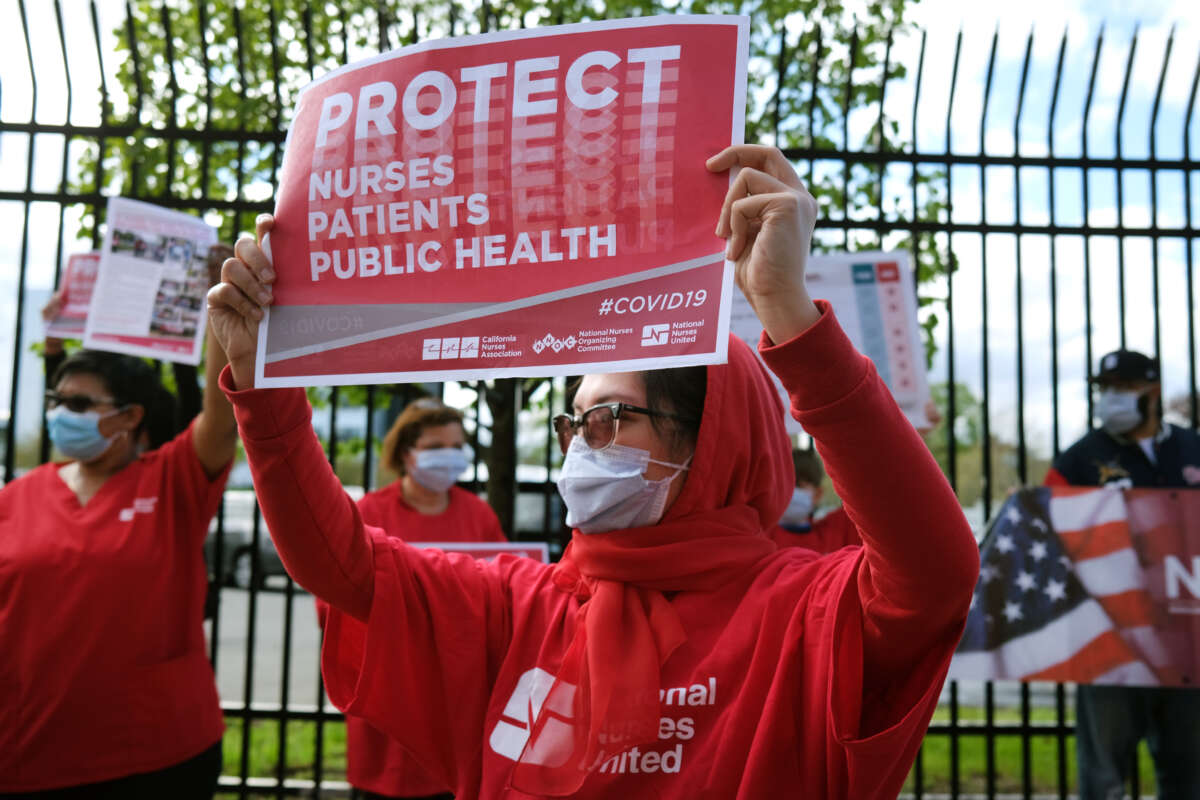Honest, paywall-free news is rare. Please support our boldly independent journalism with a donation of any size.
An estimated 16,000 unionized nurses from private hospitals across the New York City metropolitan area announced strike authorizations on Friday as current contracts are set to expire and the region continues to experience a “tridemic” health crisis that includes Covid-19, flu, and the respiratory illness known as RSV.
The New York State Nurses Association (NYSNA) issued ten-day notices on Friday for strikes to begin on January 9 if contract agreements are not reached at eight hospitals, including NewYork-Presbyterian, Montefiore, Mount Sinai Hospital, Mount Sinai Morningside and West, Maimonides, BronxCare, Richmond University Medical Center, and Flushing Hospital Medical Center.
Nurses at each of the hospitals voted separately on whether their union members would go on strike as they called for better caregiver-to-patient ratios, increased benefits, and a sustainable and fair solution to chronic staffing shortages.
In a statement, the NYSNA said the notices “give hospitals time to plan care for patients while nurses are on strike. But the best way for management to protect patients is to listen to nurses and settle fair contracts that protect patient care in the next 10 days.”
“We are truly struggling,” Michelle Gonzalez, a registered nurse and NYSNA member, told local NBC affiliate News 4 outside a hospital in Yonkers on Friday. “We have been telling the institution that there is not enough of us, that we can not split ourselves into two people — if we could, we would easily have done that already.”
“This is about our communities,” added Vanessa Weldon, another nurse and member of the union. “This is about providing the best patient care to our community.”
Weldon said the message to management “is that we need a fair contract.” According to Gonzalez, the strike authorizations at the various hospitals are about making sure the voices of nurses are being heard.
“Somebody has to hear us,” she said. “Somebody needs to understand that we are struggling. This is not going to be sustainable for much longer and we’re only continuing to lose more healthcare workers” if action is not taking to improve working conditions and benefits for the nursing staff.
Ahead of the vote and Friday’s announcement, NYSNA president Nancy Hagans, BSN, RN, said the union does not take the strike threat “lightly.”
“Striking is always a last resort,” Hagans said. “But we are prepared to strike if our bosses give us no other option. Nurses have been to hell and back, risking our lives to save our patients throughout the Covid-19 pandemic, sometimes without the PPE we needed to keep ourselves safe, and too often without enough staff for safe patient care.”
“Instead of supporting us and acknowledging our work,” she added, “hospital executives have been fighting against Covid nurse heroes. They’ve left us with no other choice but to move forward with voting to authorize a strike for better patient care.”
Trump is silencing political dissent. We appeal for your support.
Progressive nonprofits are the latest target caught in Trump’s crosshairs. With the aim of eliminating political opposition, Trump and his sycophants are working to curb government funding, constrain private foundations, and even cut tax-exempt status from organizations he dislikes.
We’re concerned, because Truthout is not immune to such bad-faith attacks.
We can only resist Trump’s attacks by cultivating a strong base of support. The right-wing mediasphere is funded comfortably by billionaire owners and venture capitalist philanthropists. At Truthout, we have you.
Truthout has launched a fundraiser to raise $41,000 in the next 7 days. Please take a meaningful action in the fight against authoritarianism: make a one-time or monthly donation to Truthout. If you have the means, please dig deep.
